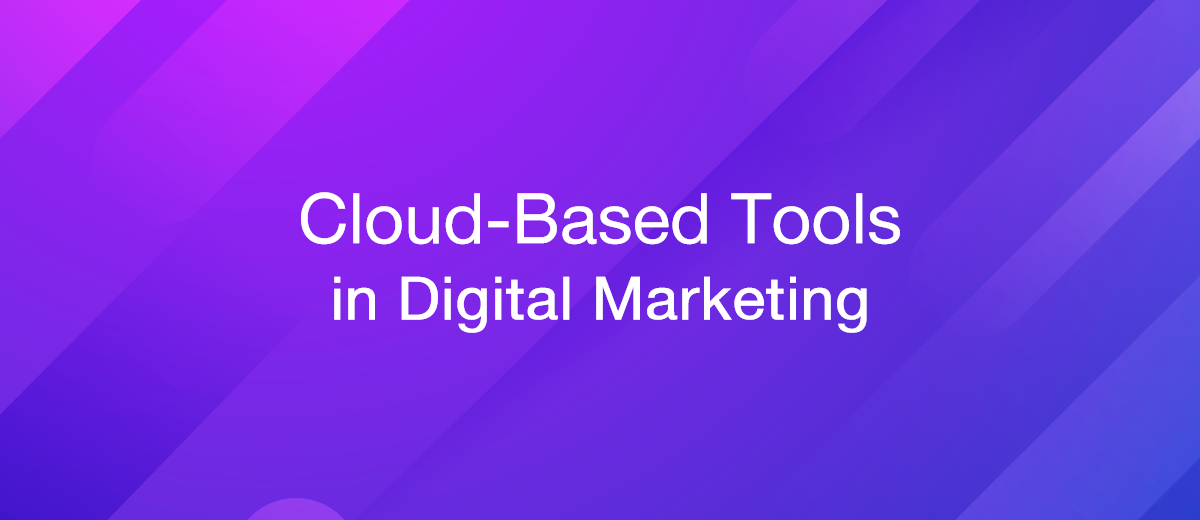Elevating Your Strategy: The Role of Cloud-Based Tools in Digital Marketing
In an era where technology reigns supreme, the field of digital marketing is undergoing a remarkable transformation. The advent of cloud technology, in particular, is reshaping the way businesses strategize, implement, and assess their marketing efforts. As the digital landscape continues to evolve, staying competitive necessitates more than just keeping pace with these changes — it requires harnessing them to elevate your marketing strategy.
This article will guide you on a journey through the world of cloud-based tools, a game-changer in digital marketing. We'll uncover how these tools, powered by the cloud's vast capabilities, can streamline operations, deliver real-time analytics, enhance customer engagement, and more. By understanding and leveraging the power of cloud-based tools, businesses can unlock new avenues for innovation, growth, and success in their digital marketing strategies.
Understanding Cloud-Based Tools
Cloud-based tools, also known as cloud applications or cloud services, are software applications where the underlying computing resources, such as servers and storage, are delivered over the Internet. This cloud delivery model provides users with access to software applications that run on shared computing resources, which can be accessed from anywhere, at any time, via a web browser or app.

In the realm of digital marketing, a wide variety of cloud-based tools are utilized to streamline and enhance marketing efforts. Here's a brief rundown of a few key types:
- Customer Relationship Management (CRM) Tools: These tools help businesses manage and analyze customer interactions and data throughout the customer lifecycle. Cloud-based CRMs like Salesforce and HubSpot provide real-time access to customer data, aiding in improving business relationships and assisting in customer retention.
- Search Engine Optimization (SEO) Tools: SEO tools, such as SEMrush or Ahrefs, provide cloud-based platforms that help marketers improve their website's visibility on search engine results pages. They offer functionalities like keyword research, backlink analysis, and content optimization.
- Content Management Systems (CMS): Cloud-based CMS like WordPress or Joomla allow marketers to create, manage, and modify digital content without needing specialized technical knowledge. They are vital for maintaining a dynamic online presence.
- Analytics Tools: Google Analytics, a popular cloud-based tool, helps businesses understand user behavior by providing detailed statistics about a website's traffic, sources, and conversions.
These are just a few examples of the myriad of cloud-based tools that digital marketers can leverage to streamline processes, gain insights, and increase productivity. As we delve deeper into the role of these tools in the next section, you'll begin to see just how transformative they can be for your digital marketing strategy.
The Role of Cloud-Based Tools in Digital Marketing
The digital marketing landscape is intricate and expansive, encompassing a range of strategies from content marketing and SEO to social media management and email marketing. In the midst of this complexity, cloud-based tools play an integral role, providing the resources necessary to manage, optimize, and track these diverse marketing efforts.
One of the primary roles of cloud-based tools in digital marketing is to streamline operations. With these tools, businesses can automate repetitive tasks, manage content across various platforms, and coordinate team efforts, all from a centralized location. For instance, a cloud-based project management tool like Asana or Trello can help manage and track marketing tasks, fostering collaboration and efficiency within marketing teams.
- Automate the work of an online store or landing
- Empower through integration
- Don't spend money on programmers and integrators
- Save time by automating routine tasks
Furthermore, cloud-based tools are instrumental in gathering and analyzing data. Analytics tools such as Google Analytics or Adobe Analytics provide valuable insights into customer behavior, enabling marketers to make data-driven decisions. These tools track a variety of metrics, from website traffic and bounce rate to conversion rates and customer engagement. This data can guide marketers in tailoring their strategies to better meet their audience's needs and preferences.
In the realm of customer relationship management, cloud based CRM tools are vital. They provide a platform for businesses to manage their relationships and interactions with both potential and existing customers. This includes tracking customer interactions, managing customer data, and even predicting customer behaviors through machine learning algorithms.
Social media is another area where cloud-based tools have a significant impact. Tools such as Hootsuite and Buffer help businesses manage their social media presence, schedule posts, and monitor their brand's online reputation. These tools make it possible to coordinate a consistent and engaging social media strategy across multiple platforms.
In essence, the role of cloud based tools in digital marketing is multifaceted, providing the means to streamline operations, analyze data, manage customer relationships, and optimize social media strategies. As we'll discuss in the next section, the benefits of using these tools in your marketing strategy are substantial and far-reaching.
Benefits of Using Cloud-Based Tools in Your Marketing Strategy
The adoption of cloud-based tools in digital marketing comes with an array of compelling benefits that can propel a business's marketing strategy forward. Here are some key advantages:
- Efficiency and Productivity: Cloud-based tools streamline marketing operations by automating repetitive tasks, improving collaboration, and providing a centralized platform for managing various marketing activities. This increased efficiency can free up time for focusing on strategic planning and creative tasks.
- Data-Driven Decisions: With robust analytics features, cloud-based tools provide insights into customer behavior and campaign performance. This real-time data enables marketers to make informed decisions, fine-tune their strategies, and optimize their ROI.
- Scalability: Cloud-based tools are inherently scalable, allowing businesses to easily adjust their services based on their current needs and resources. This scalability can lead to cost savings, as businesses only pay for what they use.
- Accessibility: Since cloud-based tools are accessed over the internet, they can be used anywhere, anytime, and on any device with internet connectivity. This accessibility is particularly valuable for remote teams or organizations with multiple locations.
- Improved Customer Engagement: Tools like CRM systems help businesses personalize their interactions with customers, leading to improved customer satisfaction and loyalty.
In summary, integrating cloud-based tools into your marketing strategy can lead to improved efficiency, informed decision-making, increased scalability, and enhanced customer engagement. As we move to the next section, we'll address potential challenges in implementing these tools and how to overcome them.
Overcoming Challenges in Implementing Cloud-Based Tools
While cloud-based tools offer considerable benefits, implementing them is not without challenges. Understanding these potential hurdles is the first step to successfully integrating these tools into your digital marketing strategy. Let's delve into some common challenges and how to overcome them.
- Security Concerns: Storing and handling data in the cloud can raise security concerns. To mitigate these, it's crucial to choose reputable cloud service providers that adhere to stringent security standards. Regular audits and data encryption can also enhance security.
- Technical Difficulties and Integration: Learning new tools can be daunting, and integrating them with existing systems can present technical challenges. To tackle this, opt for user-friendly tools that offer strong customer support and provide ample training to your team. Also, consider tools that easily integrate with your existing systems to ensure a seamless transition.
- Data Management: Managing and organizing the vast amount of data gathered by cloud-based tools can be overwhelming. Employing data management strategies, such as defining clear data governance policies and using data visualization tools, can help in making sense of this data.
- Cost Concerns: While cloud-based tools can lead to cost savings in the long run, the initial investment might be substantial. Therefore, it's important to clearly understand the pricing structure of these tools and consider the ROI they can deliver.
- Reliance on Internet Connectivity: As these tools are cloud-based, they require a reliable internet connection. To address this, ensure you have dependable and high-speed internet access.
Conclusion
In the rapidly evolving digital marketing landscape, the importance of cloud-based tools cannot be overstated. By streamlining operations, providing valuable insights, fostering customer engagement, and offering scalability and accessibility, these tools can significantly elevate your marketing strategy.
While the implementation of these tools may present challenges, such as security concerns, technical difficulties, and data management issues, these can be effectively managed with careful planning, training, and the selection of reputable, user-friendly tools.
Ultimately, the integration of cloud-based tools is not just a trend to be observed but a strategic imperative for businesses looking to optimize their marketing efforts and thrive in the digital age. By understanding and harnessing the power of these tools, businesses can stay ahead of the curve, making the most of the opportunities presented by digital marketing.
Apix-Drive is a universal tool that will quickly streamline any workflow, freeing you from routine and possible financial losses. Try ApiX-Drive in action and see how useful it is for you personally. In the meantime, when you are setting up connections between systems, think about where you are investing your free time, because now you will have much more of it.


